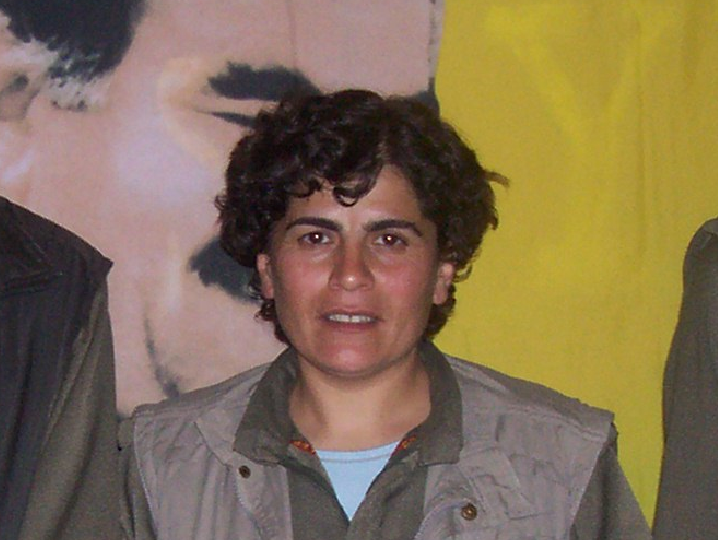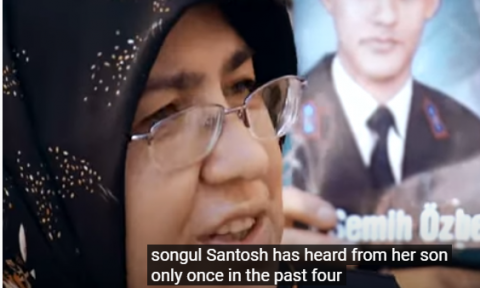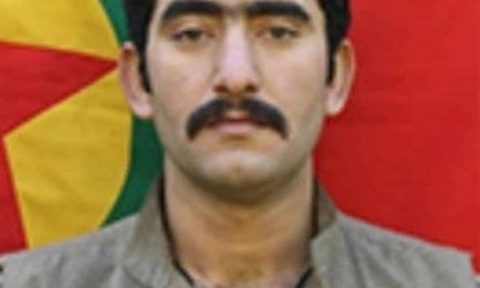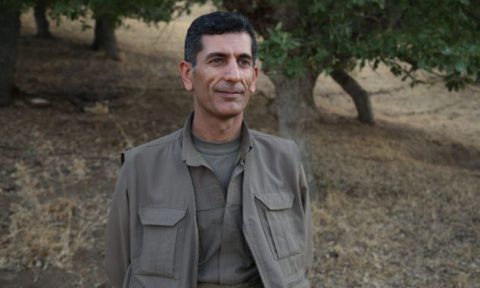Iran Kurdistan Human Rights Watch has interviewed Mr. Peshawa, a dissident member of the PKK, about Leyla Afrin, one of the commanders of the PKK’s Women’s Division.
In this conversation, he points out the points of reflection on the behavior, way of thinking and, of course, the approach of some commanders of the “PKK” group.
The dissident member of the PKK also spoke about the plight of those who are forcibly present in PKK / PJAK training camps in order to overcome their power gap and fall victim to the greed and political goals of the group’s leaders.
In the end, this person also mentions the responsibility of the Iranian government for improving the economic situation and resolving the living problems of the border and Kurdish areas.
The full text of the conversation is as follows:
Briefly describe yourself and how you were absorbed into the PKK group.
“You see, when you enter the PKK environment, you see that most of the members recruited by the group have been deceived. The main roots of PKK membership in society are poverty, unemployment, addiction and family problems.”
“I was one of those who traveled to Iraqi Kurdistan due to family problems so that I could work for a living and earn a living, because family problems prevented me from continuing my education and becoming more aware. Our family consisted of seven people, four brothers and one sister, and I was the third child. My father was old and my mother was ill, my brothers lived apart from our family, but they interfered a lot in our lives.”
“I was tired of our situation, and decided to go to Iraqi Kurdistan to work. I did not have a passport, and at the time, crossing the border was much easier. On the border between Iraqi Kurdistan and Iranian Kurdistan, in the Marivan region, I met some armed men who were collecting money from Kolbers in the name of customs. They asked me, “Where are you going?” I also replied that I was going to work in Iraqi Kurdistan. They tricked me with tricks, lies, job promises, a place to sleep, and a good income, and I was with them for about eight or nine hours on foot from the mountains until we got somewhere in Iraqi Kurdistan.”
“From there, they drove me with a driver and they gave him a note, they told me that if he stopped and checked, I would say that I had come to visit relatives. The border I crossed and the checkpoint I crossed was under the control of the Patriotic Union, and it was strange to me why they told me that if they asked me a question, I would say that I had come to visit my relatives. But I was already on my way, so I did not protest.”
So you were motivated to work and live better and fell into their trap?
“Yes, not only did I have no political motivation to go there, but my education was up to graduation of high school and I envisioned going to university and a future separate from the Kurdish parties. My only goal was to find a job so that I could get away from my family problems and make ends meet.”
What happened after you got there?
“Two days later, in a place called the Guest House, I was sent from the Panjwin area to Qandil, then they took all my clothes and belongings from me and conducted a physical examination as if I were their prisoner. After that, a person named “Farhad” spoke to me and told me in words that smelled of threats and warnings, “You should not be with the Iranians, you should not be alone, you should not say anything other than the words we use here. When we say repeat, you repeat, you should not look at the women, and you should listen to what the commander tells you and obey it.””
Define the rules of that training camp.
“There was a PKK news channel in that camp at seven o’clock at night, which we had the right to see only, and at eight o’clock at night we all had to be in our rooms, rooms that were the size of a barn and where seven or eight people slept. It was considered, but the commander had a separate bed and room for himself.”
“Every day at 4:30 in the morning, they would wake us up for breakfast, after an hour of so-called exercise, they would line us up and show us some military moves in the form of training.”
So this was the result of that better life and the initial deceptive words?
“In the first three days, it became clear that there was no news of work, no comfortable sleeping place, as promised, and no money. They used Kurdish children, like their slaves, for a piece of bread or a pack of cigarettes as they wished.”
When you found out about the situation, did you not take any action to return?
“I talked to “Commander Farhad” who, before entering here, told me that we would give you a job and a place to sleep, but that did not happen, I want to return.I had no knowledge of the PKK at the time, but I realized that there was distrust of Iranian members among them.”
“Farhad told me that after the training he would send me somewhere to talk so that I would be sent home, and I believed his promise.”
Describe the situation of the commanders you saw in those years.
“They kept talking about “Osman Ocalan” as if he had separated from the PKK with a group of thousands. In those days, we could clearly see the internal differences between the commanders of the control group, we had no right to look at the girls, but the commanders treated them as they wished. For example, at the end of the period, one of these commanders fled with an Iranian girl from Mako.”
“One of those days, there was a person who was said to be “Comrade Juma” who was the same as “Cemil Bayek”, he was the opposition faction of Osman Ocalan.
“Before the meeting with him, they threatened us again not to speak if you had any problems or had seen any immoral things in the camp. It was clear they wanted the meeting to go well.”
“I had never known or seen Cemil Bayek before, he was about fifty or sixty, an older man. There was a bodyguard around him, one bringing him tea, one putting a chair for him, and another putting a blanket on his chair”
Were you present at the meeting with Cemil Bayek?
“Yes, in that meeting I told him why these people should deceive us and lie to us? I came to Iraqi Kurdistan to work, and they promised me a job and an income, only to reply, “You do not know the PKK yet, stay a while to get to know it,” and unfortunately they did not allow me to speak any more.”
Define the continuation of the training course.
“When the training course ended, hoping that I would return to Iran and talk to me, all the commanders stumbled upon me and sent me to another area, farther from the Iranian border, and we engaged in a training called “Mazlum Dogan”. Which was a course of ideological political education. There we had two training camps, one a Turkish camp and the other a Kurdish camp. We were separated on base of the language we knew best”
“The number of members in each camp was close to 50 or 60. Their education was based on Ocalan’s new book, Defending a People. In that book, Ocalan claimed that we had abandoned the ideology of the Kurdish state and tried to tolerate it alongside the ruling government, but when we looked at the environment and the members who had lived for years only in war and killing and government thinking. We saw that these issues were difficult for some to digest”
“Some claimed to understand Ocalan, but they were worse than others. Mustafa Qarasu was in charge of those training courses. This person had several substitutes in each training camp, two women and two men. Most of them were in Ocalan’s class in Syria, claiming that they understood Ocalan, but their behavior and speech smelled of dictatorship”
“While most of them were illiterate, rural and most of them, like me, were deceived by the group at a young age”
“Most of the teachers were Kurds from Syria and Turkey, and had been in Ocalan’s classes that were held in Syria from 1980 to 1998.”
With all this, you had no other attempt to return except to discuss with Commander Farhad?
“The border between Turkey and Syria was nothing more than a barbed wire, I was waiting for someone to talk to me about returning home, but instead they started threatening and reporting me.”
“I also mentioned above that in the PKK environment, Iranian members have always been met with suspicion, and disrespect, and they are considered small.”
Tell us about Leila Afrin.
“Leila Afrin” was one of the women who was attracted to the PKK as a child, from Syrian Kurdistan (the city of Afrin), who claimed to understand Ocalan”
“Because they themselves were commanders, they did whatever they wanted, but in the end, arrogance and disrespect did not leave the right to speak freely for others. Almost everyone in this training course was upset and helpless with this lady.”
“For example, if I want to say, an Iranian girl who was from Salmas and had problems with her two kidneys was repeatedly disrespected and rebuked by Leila Afrin who called that girl a burden. The 16-year-old girl “committed suicide” with a gun under her chin on a hot summer day at the training site.”
“Some in that camp debated whether to declare this girl a martyr or not, some called her a traitor, but no one blamed Leila, no one blamed her behavior.”
“Leila, like other PKK commanders, had extracted sentences from Ocalan’s books and kept repeating them to new members, gesturing to be wise”
“I have never forgotten the suicide scene of that Iranian girl and I am sorry to say that “suicide” is the fate of some members of the group”
“I do not know what they did to the body of that 16-year-old girl, but years later I saw Leila Afrin in Qamishli”
“Leila had just eaten and slept, and with the efforts of others, had reached “Rojava leadership.”
“After years she had not changed, she was older and had not changed in her bragging of rights. Now Leila came to claim that “we do not want a government, we have a system of self-government”, but their behavior was completely the opposite of the ideology they were talking about”
“Many people were displaced in Syria, their children were killed, immorality eventually developed, and Leila and others like her established the popular resources of the Syrian people in their luxury cars and luxurious houses where they eat and slept”
How was your situation?
“Years passed without anyone talking to me, and even those who intended to escape were always in danger of being killed from behind (while fleeing).”
“If the group caught them, they would either be imprisoned or convicted in military courts called “platforms” and worked like slaves for years. Or they even went so far as to forbid them to carry weapons and guards, because these people were no longer trusted.”
“I was no exception, and instead of talking to me, I was threatened with death by fleeing, so I had no choice but to keep quiet and work.”
“I was transferred to Turkey and the mountains of that country and to places where I never dreamed that one day I would enter such areas. Caves full of moisture, wet ground and harsh winter conditions without baths, without the minimum sanitary conditions that may be very difficult to describe, these were the lives they built for us.”
In your opinion, what action can be taken by the “Iranian government” to reduce the membership of Iranian Kurdish children and adolescents in militant groups?
“When we look at the environment of PKK and PJAK, we see that most of their members or those who are attracted to this group, they have been deceived.”
“The mentioned groups keep the door open on all those who have had problems in their previous lives and attract their new recruits from this path. Their target audience is those who have committed murder, theft and drug use, are indebted, have lost everything, or never had anything, shepherds, kolbers, uneducated girls and women that have only ever seen carpet weaving, and children are also good prey for being deceived by those groups because they are emotional and do not know the truths about them.”
“The truth is that because children do not know these groups, they are absorbed easily with ‘a nice story’ and then have no way back. Unfortunately, the level of education of those who are attracted to these groups is usually low or they have no education at all.”
“Those who have a higher level of education choose the path of separation over time and with true knowledge of the group, but most of them remain in their old hometowns and are thus afraid to speak out.”
“The Iranian government needs to provide conditions to solve the economic and livelihood problems of the people of these areas. Awareness of people and families about these groups will also be very effective. In my opinion, the only way to fight against these thoughts and behaviors is education, and that is enough, because those who enter the PKK and PJAK environment, the environment insists that “education, education, education”.”










